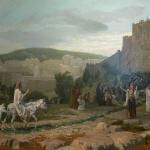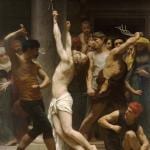
The Jews for centuries had had a dual notion of the Messiah: that of the Suffering Servant and of the conquering king. So this was nothing new. Educated Christians knew the Old Testament. It included Isaiah 53, which is the famous passage of the Messiah suffering. Whereas during the time of Jesus it was understandable that some thought that the [physical, institutional] messianic kingdom was to be established, and the end of the age was near, after He died, of course it was understood that He was the suffering servant, and that the “triumphant” messianism had to await His second Coming. In the meantime, Jesus made salvation possible by His redemptive death; and that is quite enough itself.
John the Baptist was not proclaiming a superhero and the messianic earthy kingdom: fulfilled in Jesus. If so, how odd that he referred to Him as follows: “Behold, the Lamb of God, who takes away the sin of the world!” (Jn 1:29, RSV). That’s the suffering Messiah of Isaiah 53. The Jews at the time couldn’t misinterpret the analogy of the Passover Lamb that was sacrificed. Jesus’ sacrifice on the cross was also at the time of Passover.
Mark 1:2-3 cites Isaiah 40:3 (RSV): “A voice cries: ‘In the wilderness prepare the way of the LORD, make straight in the desert a highway for our God.'” Isaiah 40:1-26 is a triumphant passage of hope. God was going to deliver the Israelites. But as always in the Old Testament, such deliverance was conditional upon obedience. And once again, as so often, God didn’t receive that, as the grand narrative of the magnificent book of Isaiah continues. Thus, we see the beginning of this discontent in the same chapter:
Isaiah 40:27 Why do you say, O Jacob, and speak, O Israel, “My way is hid from the LORD, and my right is disregarded by my God”? (cf. 49:14: “. . . “The LORD has forsaken me, my Lord has forgotten me.”)
God in effect responds to this rebellion and rejection in Isaiah chapters 41-47. Isaiah 42 describes what could have been, had Israel been obedient. But it was not, and Israel’s exile came about as a result (43:22-28). Then Babylon is judged for opposing Israel (chapters 46-47). Isaiah 48 is God’s merciful response to Israel’s rebellion. God declares:
Isaiah 48:6 . . . From this time forth I make you hear new things, hidden things which you have not known.
The text then highlights the “Servant” (chapters 49-55) which represents both the Messiah and the nation of Israel (prophecies often have multiple applications in Scripture). The Servant’s mission is to Israel first, then “as a light to the nations, that my salvation may reach to the end of the earth” (49:6). But the “Servant” is also rejected:
Isaiah 49:7 . . . one deeply despised, abhorred by the nations . . .
Isaiah 50:6 I gave my back to the smiters, and my cheeks to those who pulled out the beard; I hid not my face from shame and spitting.
Nevertheless the Servant continues to proclaim a message of good news (chapters 51-52). But what happens next is that the full suffering of the Servant is revealed: and its purpose:
Isaiah 52:13-53:12 Behold, my servant shall prosper, he shall be exalted and lifted up, and shall be very high. [14] As many were astonished at him — his appearance was so marred, beyond human semblance, and his form beyond that of the sons of men — [15] so shall he startle many nations; kings shall shut their mouths because of him; for that which has not been told them they shall see, and that which they have not heard they shall understand. [1] Who has believed what we have heard? And to whom has the arm of the LORD been revealed? [2] For he grew up before him like a young plant, and like a root out of dry ground; he had no form or comeliness that we should look at him, and no beauty that we should desire him. [3] He was despised and rejected by men; a man of sorrows, and acquainted with grief; and as one from whom men hide their faces he was despised, and we esteemed him not. [4] Surely he has borne our griefs and carried our sorrows; yet we esteemed him stricken, smitten by God, and afflicted. [5] But he was wounded for our transgressions, he was bruised for our iniquities; upon him was the chastisement that made us whole, and with his stripes we are healed. [6] All we like sheep have gone astray; we have turned every one to his own way; and the LORD has laid on him the iniquity of us all. [7] He was oppressed, and he was afflicted, yet he opened not his mouth; like a lamb that is led to the slaughter, and like a sheep that before its shearers is dumb, so he opened not his mouth. [8] By oppression and judgment he was taken away; and as for his generation, who considered that he was cut off out of the land of the living, stricken for the transgression of my people? [9] And they made his grave with the wicked and with a rich man in his death, although he had done no violence, and there was no deceit in his mouth. [10] Yet it was the will of the LORD to bruise him; he has put him to grief; when he makes himself an offering for sin, he shall see his offspring, he shall prolong his days; the will of the LORD shall prosper in his hand; [11] he shall see the fruit of the travail of his soul and be satisfied; by his knowledge shall the righteous one, my servant, make many to be accounted righteous; and he shall bear their iniquities. [12] Therefore I will divide him a portion with the great, and he shall divide the spoil with the strong; because he poured out his soul to death, and was numbered with the transgressors; yet he bore the sin of many, and made intercession for the transgressors.
All of this, of course, is a prophecy of exactly what would happen with Jesus Christ: God the Son / Son of God. He came as the expected Messiah, but was rejected and killed on the cross. But this was God’s plan to save mankind. Many missed that (included all those who rejected Jesus Christ), but it was there in plain view, in Isaiah (written many centuries before). And this is the backdrop of the Gospel presentation of the life and mission of Jesus. Precisely for this reason, Jesus cited Isaiah in public, in a synagogue, at the beginning of His public ministry, in his own hometown of Nazareth:
Luke 4:16-21 And he came to Nazareth, where he had been brought up; and he went to the synagogue, as his custom was, on the sabbath day. And he stood up to read; [17] and there was given to him the book of the prophet Isaiah. He opened the book and found the place where it was written, [18] “The Spirit of the Lord is upon me, because he has anointed me to preach good news to the poor. He has sent me to proclaim release to the captives and recovering of sight to the blind, to set at liberty those who are oppressed, [19] to proclaim the acceptable year of the Lord.” [20] And he closed the book, and gave it back to the attendant, and sat down; and the eyes of all in the synagogue were fixed on him. [21] And he began to say to them, “Today this scripture has been fulfilled in your hearing.”
After He said a bit more, here was the response:
Luke 4:28-29 When they heard this, all in the synagogue were filled with wrath. [29] And they rose up and put him out of the city, and led him to the brow of the hill on which their city was built, that they might throw him down headlong.
Jesus was citing Isaiah 61:1-2 and also 58:6. He was thus claiming to be the Old Testament Servant, who was the Messiah. It was all foretold in the Old Testament before any Gospel writer was born. So to make out (as atheists and biblical skeptics do) that they “invented” the whole story because Jesus disappointed their expectations and failed to reign triumphant over all mankind, and was instead tortured and killed, is ludicrous. Mark’s Gospel recounts the same incident, but only in bare outline: Jesus was “in his own country” (6:1), taught in the synagogue (6:2), the people “took offense” (6:3), and Jesus noted that a prophet is not honored in his home town (6:4; cf. Lk 4:24). Matthew’s account (13:54-58) is similar to Mark’s.
***
Related Reading:
***
Photo credit: Prophet Isaiah predicts the return of the Jews from exile, by Marten van Heemskerck (1498-1574) [public domain / Wikimedia Commons]













